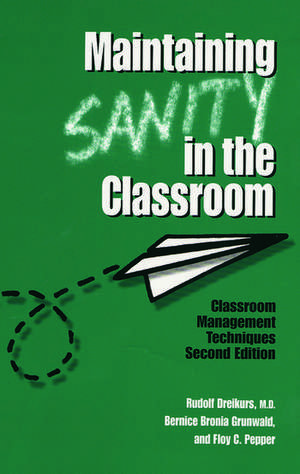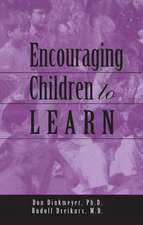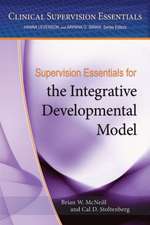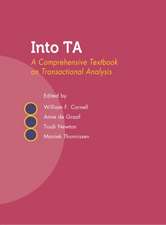Maintaining Sanity In The Classroom: Classroom Management Techniques
Autor Rudolf Dreikurs, Bernice Bronia Grunwald, Floy C. Pepperen Limba Engleză Paperback – feb 1998
| Toate formatele și edițiile | Preț | Express |
|---|---|---|
| Paperback (1) | 318.20 lei 3-5 săpt. | +24.70 lei 4-10 zile |
| Taylor & Francis – feb 1998 | 318.20 lei 3-5 săpt. | +24.70 lei 4-10 zile |
| Hardback (1) | 969.57 lei 6-8 săpt. | |
| Taylor & Francis – 24 noi 2015 | 969.57 lei 6-8 săpt. |
Preț: 318.20 lei
Preț vechi: 334.95 lei
-5% Nou
Puncte Express: 477
Preț estimativ în valută:
60.90€ • 63.34$ • 50.27£
60.90€ • 63.34$ • 50.27£
Carte disponibilă
Livrare economică 24 martie-07 aprilie
Livrare express 07-13 martie pentru 34.69 lei
Preluare comenzi: 021 569.72.76
Specificații
ISBN-13: 9781560327271
ISBN-10: 1560327278
Pagini: 368
Dimensiuni: 152 x 229 x 19 mm
Greutate: 0.54 kg
Ediția:Revised
Editura: Taylor & Francis
Colecția Taylor & Francis
Locul publicării:Oxford, United Kingdom
ISBN-10: 1560327278
Pagini: 368
Dimensiuni: 152 x 229 x 19 mm
Greutate: 0.54 kg
Ediția:Revised
Editura: Taylor & Francis
Colecția Taylor & Francis
Locul publicării:Oxford, United Kingdom
Public țintă
Professional Practice & DevelopmentCuprins
Foreward. Preface. I. Theoretical Premises. 1. Development of the Child's Potential. 2. Goal Directed Behavior. 3. The Four Mistaken Goals. 4. Private Logic: A Diagnostic Technique for Understanding Behavior. 5. Changing the Child's Goals. 6. The Family Atmosphere. 7. The Family Constellation. II. Effective Democratic Methods. 8. The Democratic versus the Traditional Classroom. 9. Discipline and Order. 10. Winning over the Child. 11. Encouragement. 12. Logical Consequences Versus Arbitrary Punishment. 13. The Structure of the Group. 14. Group Discussions in the Classroom. 15. Specific Techniques: Group Discussions. 16. Training Children to Understand Behavior Through the Use of Stories. III. Coping with Special Academic Problems. 17. Learning Disabilities. 18. Reading Difficulties. 19. Culturally Deprived Children. 20. Pseudoretardation Reffered to as Stupidity. 21. Gifted Children and Homogeneous Grouping. 22. I.Q. Tests. IV. Coping with Special Behavior Problems. 23. The Adolescent. 24. Juvenile Delinquency. 25. Stealing. 26 Lying and Swearing. 27. Fighting. V. Parental Involvement. 28. Parent-Teacher Conferences. 29. The Family Council. 30. Parent Education. Epilogue. Index.


















